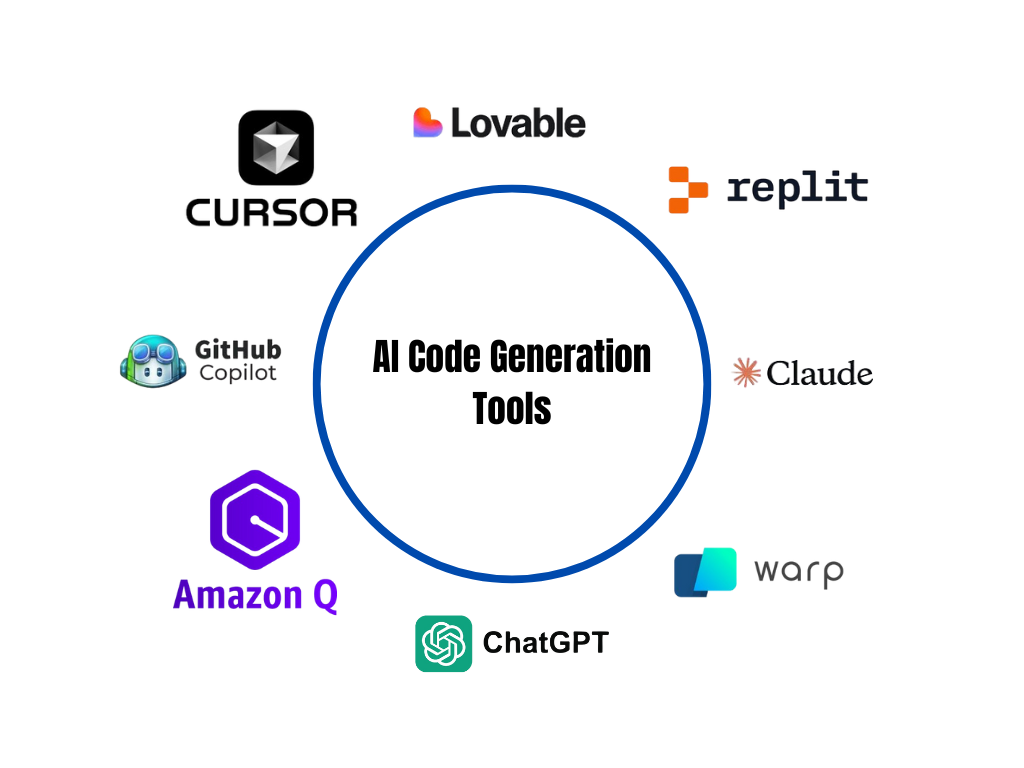However, utilizing even the best of technologies comes with certain challenges, and the same goes for AI code generation tools! Alongside the benefits of seamless coding, these AI tools can also pose challenges such as unreliable code outputs and security vulnerabilities. Well, this article will be your guide, explaining the benefits and challenges in brief. In the end, you can make the judgment call on how efficient it is to use AI for code generation.
Understanding AI Code Generation
In simple words, AI code generation is a tool-driven process that is powered by an AI assistant. Such tools leverage the potential of AI & ML for automatically generating code suggestions, software modules, and source code.
With the power of generative AI and advanced language models (LLMs), the code generation tools can automatically produce or suggest code based on the given inputs. There is a possibility that the AI-generated code might not be perfect, but the developers do get a strong starting point for taking the development process further.
From writing simple code snippets or completing complex code, developers can use natural language to make functional or feature code requests from the dedicated tools. Tools powered with AI for code generation can be integrated into your existing business system and automate repetitive tasks such as vulnerability scanning, code optimization, or bug fixing.
Here are some of the ways programmers can use an AI platform for software engineering:
-
Natural Language to Code Generation:
Developers give their inputs in human language, which then gets translated by the AI assistant into near-accurate & executable code blocks. AI code assistants make use of natural language processing (NLP) and advanced large language models (LLMs) to make this possible.
-
Database Design
Developers make use of AI coding tools to create the database design for applications as well as the backend. Some of the features of AI code generators that help in this quest include automated schema generation, database normalization, query optimization, support for version control, and more.
-
Converting Visual UI designs into Frontend Code
The advanced AI code generation tools can be used by developers to convert the visual UI designs into working front-end code. For instance, the UI designs created in Figma and Photoshop can be uploaded to an AI tool for generating relevant front-end code. Thus, developers can automate a considerable part of the overall development process.
-
Code Completion:
You can use the AI coding tools to get real-time suggestions for completing the code or predicting the next step in it, specific to the developers’ input. The tool is trained to understand the context of the code being written and makes relevant suggestions as developers continue to type. Thus, the overall possibility of errors is reduced, and the development workflow gets streamlined.
-
Code Refactoring or Optimization:
By using AI based code generation tools, you can get ongoing recommendations on how to optimize the existing code and enforce best practices. The AI coding assistant is also trained to assess any program for inefficiencies or structural discrepancies. Following that, it suggests ideal improvements to enhance performance, readability and maintainability of the code.
-
Test Case Generation:
The AI code generation tools can automatically create unit tests or diverse other test cases, based on the existing source code. This way, developers will also be able to streamline their software testing approach with less or no human intervention. Using AI code generation tools for test case generation will enhance overall accuracy, coverage, speed, and efficiency.
-
Bug Detection:
Developers can leverage the AI code assistant tools for automating the process of bug detection in code. Such tools have features like NLP, pattern recognition, and real-time code analysis, ideal for automated detection of bugs and vulnerabilities. Not just that, but the AI coding tools will also suggest necessary fixes or improvements to overcome them.
List of Popular AI Code Generation Tools in 2025

Here is the list of some of the popular AI based code generation tools that you can adopt for your developers’ convenience and streamlining the software development process:
1. GitHub Copilot:
This AI tool is built in collaboration with OpenAI and is considered the most powerful AI coding assistant. It supports diverse programming languages and can help developers with intelligent code predictions or suggestions.
2. ChatGPT:
ChatGPT by OpenAI, even though it isn’t specifically built for developers, still serves the purpose of code generation. Professionals can engage with the GPT models through natural language prompts and generate code snippets.
3. Cursor
It is one of the most useful AI-assisted IDEs, designed to help developers scale their productivity with easy code generation through text prompts. Beyond that, Cursor can also optimize existing codes and also generate code from images.
4. Lovable
Building full-stack applications or websites is now easier with Lovable AI. It is a powerful platform that encourages developers to use natural language text prompts and share the app idea. This tool will then generate the front-end, backend and database code for the same.
5. Replit
Using Replit, developers can either generate code snippets or create full-fledged applications, all using natural language prompts. Beyond code generation, this tool also supports refactoring, debugging, completion and other such features.
6. Claude Code
A popular agentic AI coding assistant, designed to streamline the complex coding tasks and speed up the overall development process. You can use it for code generation, workflow automation, architectural analysis and project understanding.
7. Warp
It is more of an agentic software development environment, powered with AI coding assistance. Developers can use this tool to intelligently complete code, generate functions, fix errors and make batch changes.
8. Code Llama:
Code Llama by Meta is designed for generating & discussing code. Developers can use it to thrive with coding tasks, streamline development workflows, and ensure software robustness. This tool supports programming languages such as Java, PHP, C++, and more.
9. Amazon Q Developer:
Formerly known as CodeWhisperer, Amazon Q Developer is an AI-driven productivity tool capable of generating code suggestions. It can generate snippets or full function codes based on your inputs.
Benefits of Using AI Code Generation Tools
Keeping aside the challenges, there are a plethora of benefits of adopting AI code generation tools for your development projects, which include:
1. Enhances Developers’ Productivity:
The AI coding tools have the capability of automating your repetitive coding tasks and bug fixes, which can boost your overall development speed and efficiency. Your overall project turnaround time will be faster, ensuring improved client satisfaction.
2. Coding Assistance:
Developers don’t have to do all the work by themselves, as the AI code generation tools can be their advanced virtual assistants. Your team of developers can get code alternatives, predictions, or suggestions, guiding them to achieve utmost efficiency and better software performance.
3. Limits the Switching of Contexts:
In an usual code development process, human professionals often switch contexts! For instance, a developer might look for certain documentation, run tests on the CLI, or search for code snippets, all at the same time. Using AI tools can help developers do everything under one roof through natural language inputs.
4. Lowers Mental Strain of Developers:
Traditional coding with complete human effort is often exhausting and leads developers to experience mental burnout. With AI code generation capabilities, a portion of the cognitive load of programming software is taken off the human brain. Thus, the overall mental burden or strain decreases for the developers.
5. Consistency Across Development Teams:
An AI-generated code often has standardized patterns, making it easier to achieve consistency across the entire team’s work. It means that understanding, collaborating, and maintaining software projects will be easier, even when the team grows or new members join in.
Potential Challenges of Implementing AI Code Generation
The primary purpose of AI code generation tools is to assist developers in delivering quality software products within a short timeframe. However, there are certain challenges that both organizations as well as developers might have to deal with before implementing this practice, which include:
1. Quality & Reliability of the Generated Code:
Most AI code generation tools like GitHub Copilot, ChatGPT, or Amazon Q Developer are now improved or enhanced for providing near-accurate and reliable coding outputs. However, there is still a chance that the AI assistants might produce insecure or buggy code at times. This way, the need for reviewing the AI-generated code increases!
Solution:
The companies willing to use AI for code generation are encouraged to adopt dedicated review frameworks that can assess the performance, security, and functionality of AI-generated code.
2. Chance of Increased Technical Debt:
The genAI coding tools or models are trained to prioritize generating code snippets that might be syntactically accurate, but might not be optimized for maintainability, efficiency, or quality. Thus, it might lead the developers to produce a harder-to-understand code with an extensive burden on modifying it, resulting in increased technical debt.
Solution:
Due to this issue, AI code generation is often proven to be more effective in the hands of trained programmers than citizen developers. To further mitigate this risk, you must implement a standardized review process to evaluate the scalability and maintainability of AI-generated code.
3. Losing Out on Developer’s Autonomy:
There are developers worrying about losing out on their effective coding skills or expertise by relying heavily on AI tools. In the long run, this challenge will result in negligence among developers, as businesses will have AI to generate code, but no qualified professionals to assess it.
Solution:
For overcoming this challenge, organizations must use AI based code generation as a supplemental technology alongside human expertise, instead of replacing it. Alongside that, there must be ongoing training programs to guide developers on how to work with AI tools for achieving better proficiency in diverse projects.
4. Code Maintainability:
At times, the AI coding tools might generate a snippet that’s more complex than expected. Such over-engineering might lead the team to spend more time understanding, updating, debugging, and simplifying the AI-generated code. This way, the future maintenance efforts will be complicated!
Solution:
Organizations must overcome this challenge by setting guidelines on the clarity and simplicity of the code being generated. And that’s possible by regularly reviewing the AI-generated codes and pointing out the unwanted complexities in them.
Difference Between AI Code Generation and Low-Code Development
People often refer to AI code generation and low-code development as interchangeable, which isn’t completely right! Even though both low-code development and AI coding tools support rapid code generation, they still work on diverse principles. The potential differences include:
Low-Code Development:
The low-code development tools often empower users to create apps using a visual or graphical interface and leverage prebuilt components such as libraries or templates for the process. Thus, the major coding process gets automated in this approach. With low-code development, the overall coding workload of developers is reduced, making the overall app development process simpler.
AI Code Generation:
On the other hand, the AI coding tools make use of advanced LLMs that don’t depend on any predefined libraries or templates. Instead, they take natural language prompts from developers and generate code to meet the purpose. Such AI tools help developers write code from scratch and optimize it to serve the desired outcomes.
Future of Coding with AI and Human
You must know that AI code generation is meant to transform software development in terms of productivity, workflow efficiency, and code quality. From completing codes with intelligent predictions & suggestions to generating source codes from scratch, the AI code generation tools are now delivering promising outcomes. However, to leverage the full potential of AI in software development, there is a need for developers or solution architects to combine their experience with AI coding capabilities.
Even with certain evident challenges, organizations can adopt careful consideration, robust testing, and efficient planning to leverage the proven benefits of AI code assistants. Choosing the right tool will help boost your developers’ potential, making them capable of delivering quality software as quickly as possible.



